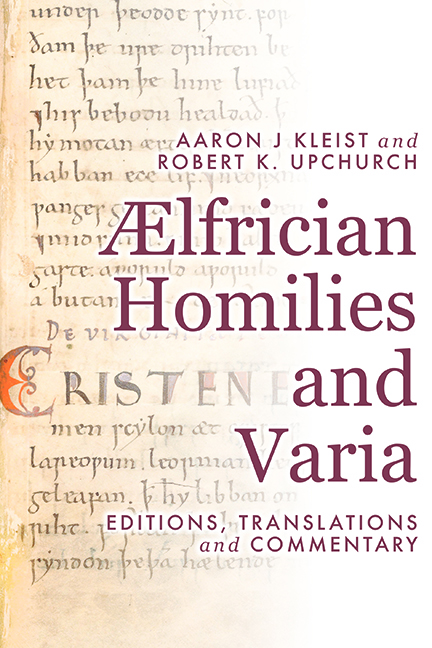Book contents
- Frontmatter
- Contents
- Preface
- Acknowledgements
- Abbreviations
- Sigla for Cited Ælfrician Manuscripts
- Dates for Cited Ælfrician Works
- Editorial Conventions
- Conventions Used in the Commentaries
- Homilies The Proper of the Season
- Homilies The Proper of the Saints
- Ælfrician Homilies and Varia: Editions, Translations, and Commentary: Volume II
- Homilies The Common of the Saints
- Homilies Unspecified Occasions
- Varia
- Works Cited
- Index
- ANGLO-SAXON TEXTS
19 - In quadragesima, de penitentia (‘In Lent, concerning Penitence’)
Published online by Cambridge University Press: 05 March 2024
- Frontmatter
- Contents
- Preface
- Acknowledgements
- Abbreviations
- Sigla for Cited Ælfrician Manuscripts
- Dates for Cited Ælfrician Works
- Editorial Conventions
- Conventions Used in the Commentaries
- Homilies The Proper of the Season
- Homilies The Proper of the Saints
- Ælfrician Homilies and Varia: Editions, Translations, and Commentary: Volume II
- Homilies The Common of the Saints
- Homilies Unspecified Occasions
- Varia
- Works Cited
- Index
- ANGLO-SAXON TEXTS
Summary
In quadragesima, de penitentia (‘In Lent, concerning penitence’) is a treatise on the practice of penitence and the doctrine of the Creed. Part one conveys seven commonplaces of sacramental confession [lines 2–33]: [1] since Christians cannot be baptized twice for the forgiveness of sins, penance cleanses them from sins committed after baptism; [2] having repented, they must cease from sin and do good; [3] God forgives every sin provided that the sinner ceases from it and repents according to a confessor's instructions; [4] one who laments sins and then repeats them is like a dog returning to eat his vomit; [5] no person should delay, lest shame in confessing to a priest result in shame in confessing before God at the Last Judgment; [6] no one receives forgiveness from God without confessing and atoning according to a priest's instructions; and [7] penitents who seek God's forgiveness for their sins ought to forgive those who have sinned against them as Christ taught in the Lord's Prayer. With a declaration that every Christian ought to know the Lord's Prayer and Creed, Ælfric then turns to expound the Creed in part two of De penitentia [lines 34–80]. He concentrates on the doctrine of the Trinity, and the unity, coeternity, and consubstantiality of the Father, Son, and Holy Spirit are primary concerns. The uniqueness of the Son's incarnation, however, gives Ælfric scope to touch on Christ's crucifixion, death, harrowing of hell, resurrection, ascension, and return, echoing language used in the Creed. Christ's Second Coming prompts the concluding reflection on the fate of the wicked and the righteous at the Last Judgment. The eternal suffering of the damned recalls the eternal shame of the unconfessed in part one, and the salvation of those who were pleasing to God looks back to the repentance that merits a penitent's inclusion among the saved.
With De penitentia's rationale for penitence and digest of core doctrine, Malcolm Godden calls attention to the treatise's ‘affinity to the standard procedure for confession’, with part one being equivalent to an exhortation to confession and part two to a discussion of the doctrine on which the penitent was customarily questioned.
- Type
- Chapter
- Information
- Ælfrician Homilies and VariaEditions, Translations, and Commentary, pp. 839 - 898Publisher: Boydell & BrewerPrint publication year: 2022

